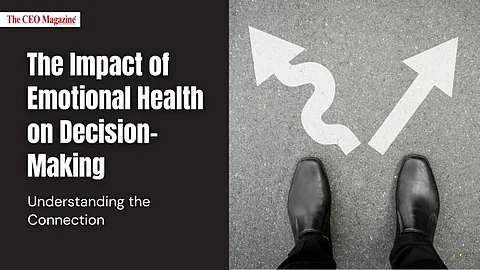
- News
- Women
- Magazine
- IndustryIndustry
- InsightsInsights
- Success Stories
- PublishPublish
- ContactContact
- Media KitMedia Kit

The Impact of Emotional Health on Decision-Making: Understanding the Connection
Emotional health plays a crucial role in shaping our decision-making processes. Our emotions influence how we perceive situations, evaluate options, and make choices. Understanding this connection can help us make better decisions and improve our overall well-being. This article explores how emotional health impacts decision-making and provides strategies for managing emotions to enhance decision-making outcomes.
Emotional health refers to our ability to manage and express emotions in a constructive manner. It involves recognizing and understanding our emotions, coping with stress, and maintaining a positive outlook. Good emotional health enables us to respond to situations calmly and make thoughtful decisions.
Emotions can significantly affect our decision-making processes. Positive emotions, such as happiness and contentment, generally lead to more optimistic and risk-taking decisions. Conversely, negative emotions, such as anxiety and anger, can impair our judgment and lead to impulsive or irrational choices. For example, stress and fear can narrow our focus, causing us to overlook important information or potential consequences.
Emotional regulation is the ability to manage and modulate our emotional responses. Effective emotional regulation helps us remain balanced and make decisions based on rational thinking rather than emotional reactions. Developing skills in emotional regulation can improve our decision-making by allowing us to approach situations with a clearer, more objective mindset.
Self-awareness involves recognizing and understanding our emotional responses. By becoming more aware of our emotions, we can better understand how they influence our decisions. Techniques such as mindfulness and journaling can help increase self-awareness and allow us to monitor our emotional state more effectively.
Mindfulness is the practice of staying present and fully engaged in the moment. It helps reduce stress and increase emotional clarity. By incorporating mindfulness techniques, such as meditation or deep breathing exercises, we can improve our ability to manage emotions and make more deliberate decisions.
Talking to a trusted friend, family member, or therapist can provide valuable perspective and emotional support. Sharing your thoughts and feelings can help you gain insights into your emotional state and receive guidance on how to approach decision-making.
Building effective coping strategies can help manage stress and emotional challenges. Techniques such as exercise, relaxation methods, and hobbies can enhance emotional resilience and reduce the impact of negative emotions on decision-making.
Reflecting on past decisions and their outcomes can provide valuable insights into how emotions influenced your choices. By analyzing what worked well and what didn’t, you can identify patterns and develop strategies to improve future decision-making.
The impact of emotional health on decision-making is significant and multifaceted. By understanding the connection between emotions and decision-making, and by implementing strategies to manage emotions effectively, you can enhance your ability to make informed and rational decisions. Prioritizing emotional health not only improves decision-making but also contributes to overall well-being and success.
Follow us on Google News
